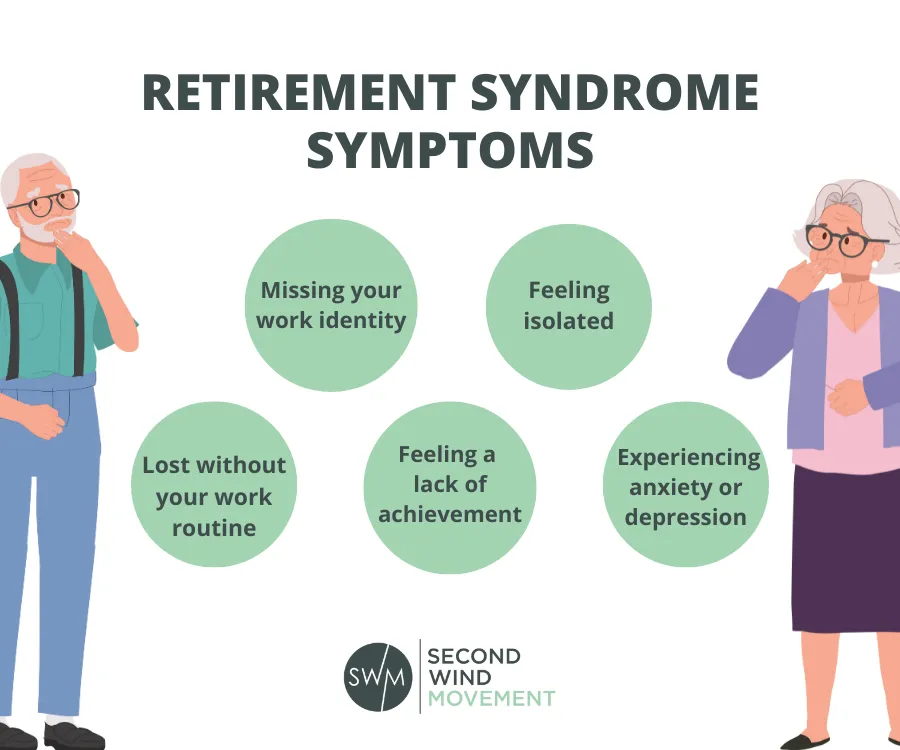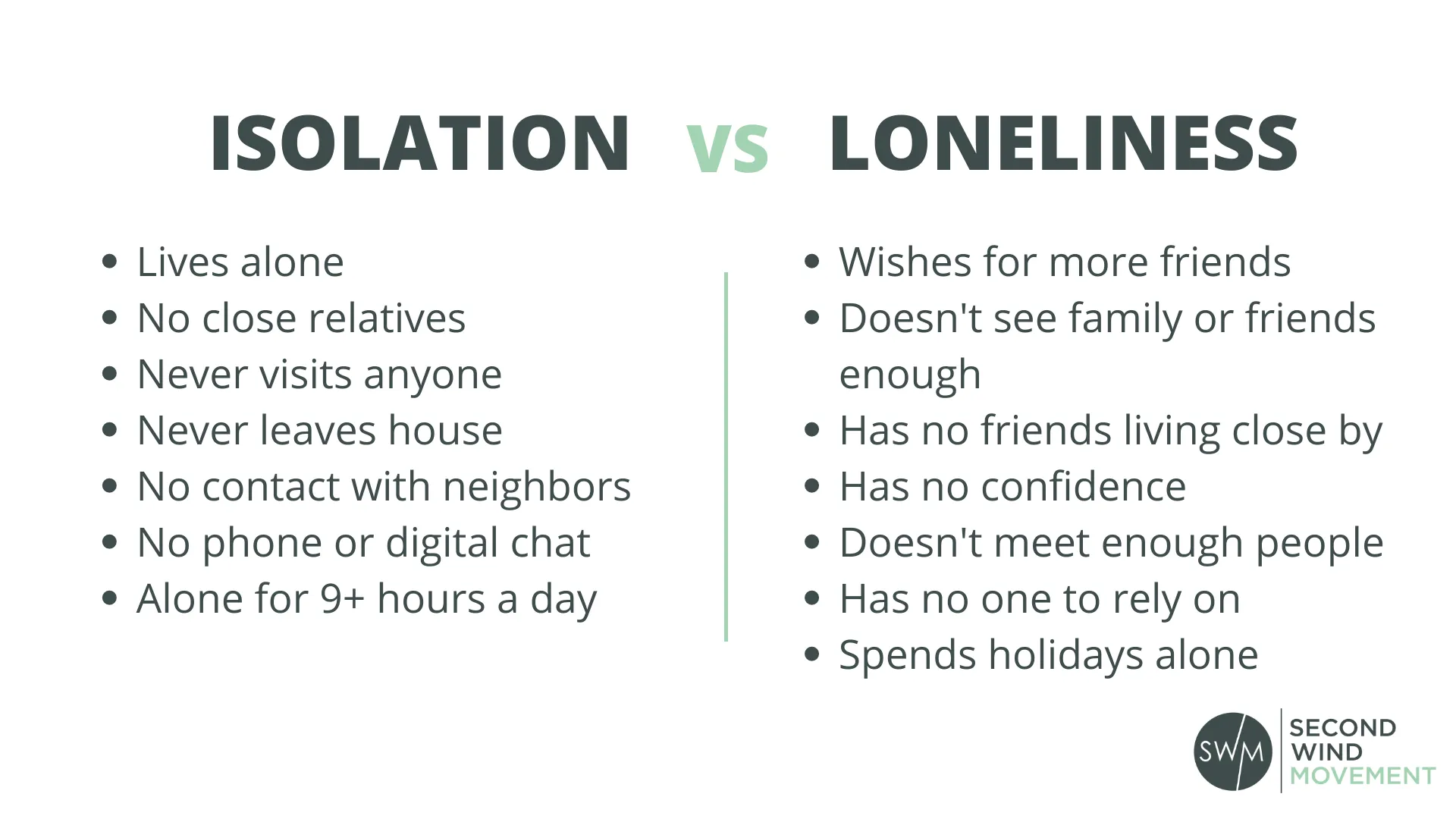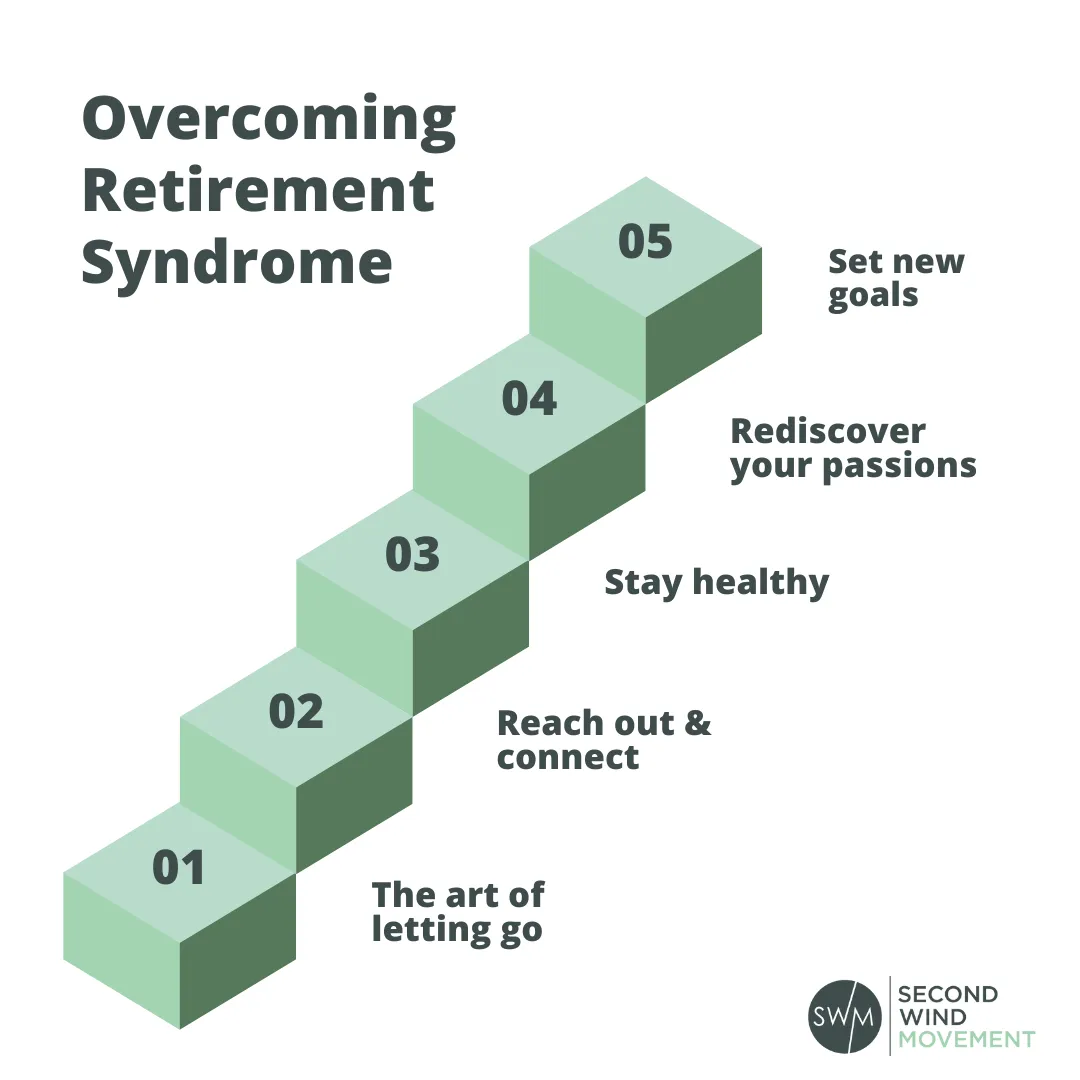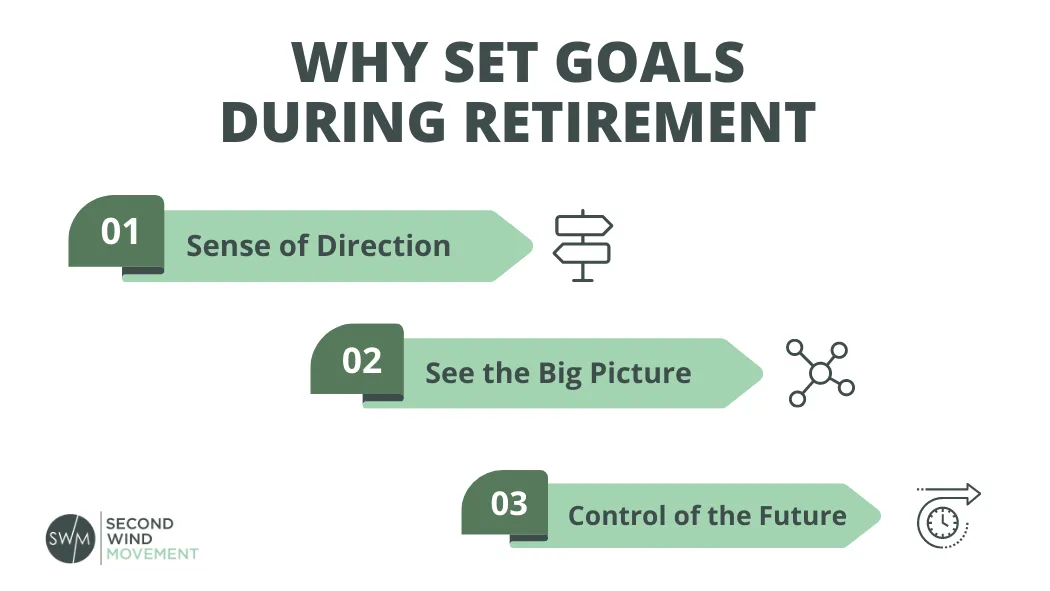You’ve always been a go-getter.
You’ve spent decades waking up to the sound of an alarm, ready to tackle whatever challenges the day had in store for you.
And you’ve weathered economic downturns, corporate mergers, and more office politics than you care to remember.
Your career has defined a significant part of who you are.
And then one day, the alarm stopped. No more early morning meetings, no more project deadlines…You’re retired.
Initially, it feels like an extended vacation. The freedom is exhilarating, where you can finally do all those things you’ve been putting off — travel, spend time with your grandkids, pick up a new hobby.
But after a while, you notice something unsettling. You miss the routine and the sense of purpose that your work gave you. Maybe you feel restless, maybe even a little lost. You might even think you’re hating retirement.
Does this sound familiar? If so, you may be experiencing what’s known as retirement syndrome.
But hey, don’t worry!
In this blog post, we’ll be exploring retirement syndrome in more detail — including how you can identify the signs early on so that you can take actionable steps towards overcoming it.
Table of Contents hide
1Understanding Retirement Syndrome
25 Ways to Spot Retirement Syndrome Symptoms
2.1#1 Feeling Lost Without Your Work Routine
2.2#2 Missing Your Work Identity
2.3#3 Feeling Isolated
2.4#4 Lacking a Sense of Achievement
2.5#5 Experiencing Anxiety or Depression
35 Steps to Overcoming Retirement Syndrome
3.1#1 The Art of Letting Go
3.3#3 Stay Healthy
3.4#4 (Re)discover Your Passions
3.5#5 Set New Goals
4The Best is Yet to Come
5Retirement Syndrome FAQ
5.1How to deal with retired husband or wife syndrome?
5.2What is pre-retirement syndrome?
5.3What is sudden retirement syndrome?
Understanding Retirement Syndrome
If you’re retired and suddenly thrust into a new phase of life where there are no deadlines, no office politics, and no work-related stress – at first, it may seem like a dream.
But for some reason, if you’re not basking in this newfound freedom, and instead, you’re feeling a sense of loss, a void that your work used to fill – you’re not alone; this is what’s known as retirement syndrome.
Retirement syndrome refers to the difficulty some people have in letting go of their professional identity and lives. It can be a tough pill to swallow when you miss the routine, purpose, and social interaction that came with your job.
Retirement syndrome isn’t something that’s often talked about, but it’s more common than you’d think. And it tends to strike those who’ve had successful careers in leadership positions.
But it’s understandable. After all, you’ve spent a third of your life working (or about 90,000 hours to be exact). It’s only natural to feel a bit lost when such a major part of your life comes to an end.
5 Ways to Spot Retirement Syndrome Symptoms
#1 Feeling Lost Without Your Work Routine
Many people miss the structure and predictability that their job provided them. Suddenly, there’s no external force dictating your day-to-day life.
You used to rise with the sun, knowing exactly what your day had in store for you. Now, you might be finding it hard to fill your days.
No boss, no work schedule, just you and a wide-open expanse of time. This shift from an externally controlled routine to one that’s internally driven can be disorienting. Or it can be an opportunity — it depends how you look at it.
(And if you’re famiilar with our content, you know our mission is to help you embrace retirement as the beginning of a big growth journey.)
But if you’re really struggling with a sense of aimlessness and boredom, it’s possible that you’re experiencing retirement syndrome.
#2 Missing Your Work Identity
You were the ‘Go-to-Gal’ or ‘Mr. Fix-it’ at work. Now that you’re retired, you’re feeling a loss of identity.
If you’re missing the sense of purpose your work provided or you’re questioning your worth without your job title, retirement syndrome could be knocking at your door.
Studies have shown that for older workers who were highly committed to their organization, retirement does pose a threat to maintaining a consistent, positive identity.
And the transition from being an active workforce participant to a retiree often brings about changes in self-perception and feelings of irrelevance.
The same research has shown that while 80% of retirees reported positive changes to their identity post-retirement, these changes were less positive than they had anticipated.
#3 Feeling Isolated
At work, you were surrounded by colleagues. Despite the drama of office politics, there was always someone to chat with over a cup of coffee or to bounce ideas off during a challenging project.
Fast forward to the present. You’ve traded the bustling office for the peace of your home. It’s quieter, calmer, but perhaps a bit lonelier, too.
And it’s completely natural to miss the social interaction that comes with work. In fact, research has found that the social aspect of work is what retirees miss the most.
Let’s take a moment to understand what we’re dealing with here. Isolation and loneliness, while related, are not the same thing.
Isolation is about physical circ*mstances, like being alone because you’re not surrounded by people as you once were at work. Loneliness, on the other hand, is a state of mind. It’s that gnawing feeling of being alone even when you’re in a crowd.
In retirement, you may experience both. You might miss the social aspect of work — that’s isolation. And you might feel a sense of disconnection even when you’re with family or friends — that’s loneliness.
But if you find yourself feeling consistently isolated or lonely, it could be a symptom of retirement syndrome.
#4 Lacking a Sense of Achievement
Think back to the days when you were in the thick of your career — when every challenging project solved or team milestone reached gave you a sense of accomplishment. You felt valued, necessary, and alive with purpose (yes, even with the stress of it).
Now, in the quiet of retirement, you might find yourself missing that feeling. You’re not alone in this. It’s a common symptom of retirement syndrome, which can leave you grappling with feelings of uselessness and post-retirement fatigue.
But your worth isn’t tied solely to your work. You’re valuable to your friends and family, to your community, and to the world at large. And there’s research to back this up.
A study involving older adults found that participants who frequently felt useful to others were less likely to experience an increase in disability or mortality over a 7-year period.
This suggests an interesting truth: your feelings of usefulness and purpose can significantly impact your overall well-being.
(P.S. if all of this rings too true to you, check out our Retirement Purpose Finder Quiz)
#5 Experiencing Anxiety or Depression
Retirement is supposed to be a time of peace and calm, but for many people, it can be anything but. Especially when you don’t do the important inner work of finding clarity first about your ideal role and lifestyle in this new life phase.
Are you finding yourself feeling anxious, depressed, or even like you’re hating retirement?
You aren’t alone — approximately 6% of older adults struggle with depression and almost 4% are riddled with anxiety.
Retirement can be a significant life change, and it’s completely normal to feel overwhelmed. But if these feelings persist, they could be a symptom of retirement syndrome.
5 Steps to Overcoming Retirement Syndrome
#1 The Art of Letting Go
First things first — embrace the idea of letting go of your career identity, which is much easier said than done.
Over the years, you’ve built a career that you can be proud of. It’s been a long journey filled with both challenges and victories. And now, it’s time to turn the page and start a new chapter in your life — retirement.
But, before you can fully embrace this new phase, it’s important to address the underlying identity shifts to let go of your professional life.
When we say “let go,” we don’t mean forget about your past or disregard your accomplishments. Far from it. Instead, think of it as shifting your perspective to find clarity on the pieces that you want to let go of vs. bring with you, and to make room for new experiences.
Life is a beautiful journey of growth and transformation, and guess what? Retirement is no exception.
You’ve been evolving and changing at every stage of life, right? From those early career days to reaching professional milestones, you’ve grown in so many ways. And retirement? Well, we see it as another opportunity for personal evolution.
Need some inspiration? Take a leaf out of Danny’s book. He’s one of our Rewire My Retirement students.
From volunteering his time to serving on health boards, blogging, running an empowering organization, speaking at industry events, consulting, and even making media appearances, Danny’s retirement is a testament to the exciting possibilities that this phase of life can hold.
To sum up, the art of letting go is all about embracing change and making the most of your retirement. It’s about taking the skills, experience, and passions you’ve developed over your career and applying them in new and exciting ways.
So as you start this new chapter, remember that letting go isn’t about losing your identity. It’s about redefining it in a way that brings you joy, fulfillment, and a fresh sense of purpose.
#2 Reach Out & Connect
The second step is to reach out to aligned people (that energy you) and stay connected and engaged. As you journey into retirement, it’s easy to feel a sense of disconnect.
Your relationships with family, friends, and even acquaintances can bring so much joy and fulfillment into your life.
And according to the longest-running study on happiness, it turns out that the secret sauce to a fulfilling life isn’t money or fame. No, it’s the close relationships we nurture that truly keep your spirits high and your heart happy.
And guess what? Now you have more time to spend with the people who matter most to you.
So why not arrange a weekly lunch with your old friends? Or plan a regular hang out with your grandchildren? Better yet, why not make new friends by joining a local club or community group?
Regardless of the activities, it’s about being selective with who you surround yourself with. There are people in life who raise you up, and then there are those who seem to drain your energy.
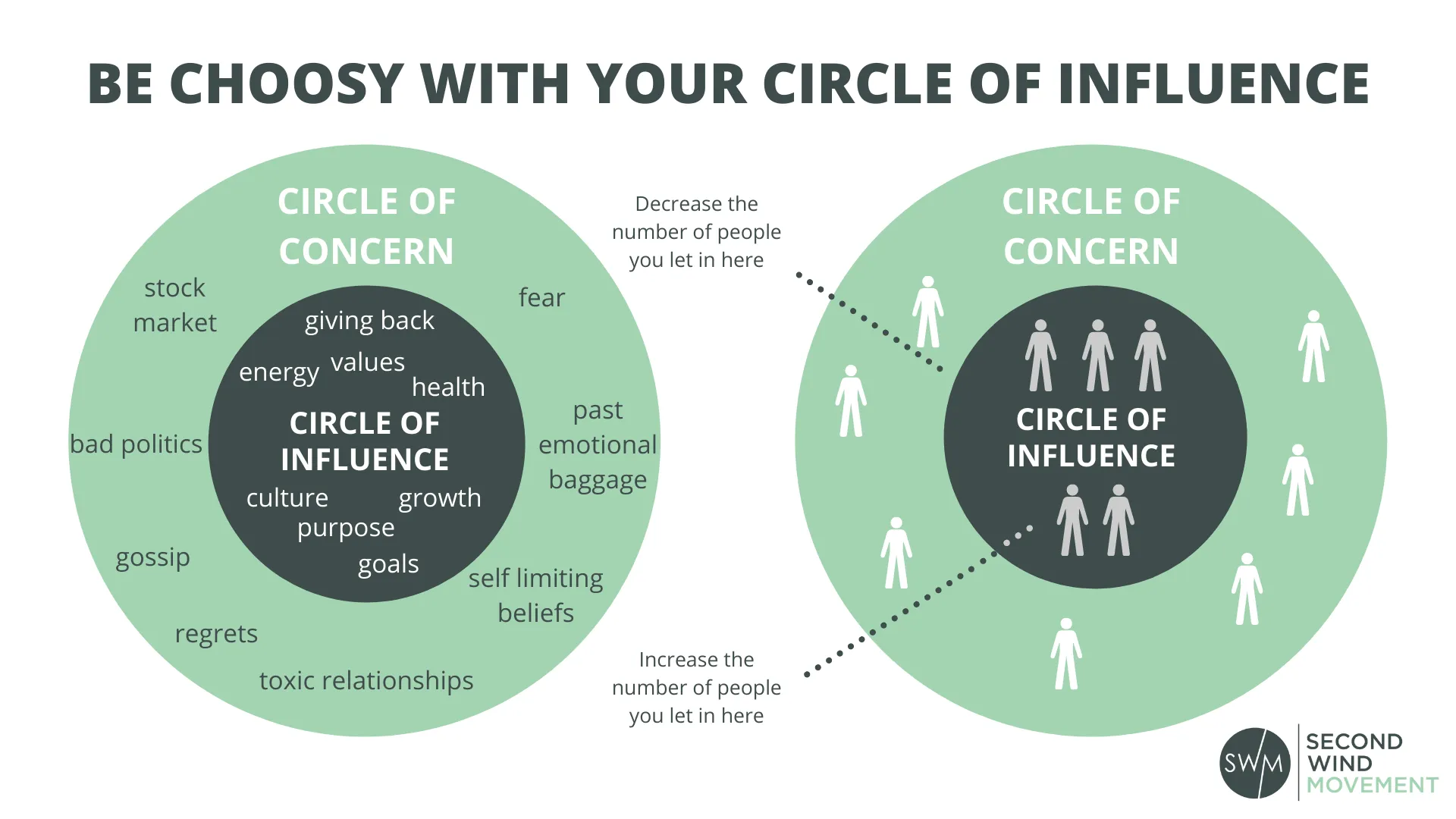
In the end, it’s all about balance. Surround yourself with positive influences and manage your interactions with those who might not be as uplifting.
#3 Stay Healthy
As you approach retirement, it’s important to focus on your health and understand how it will impact your ability to enjoy this new phase of life.
This is especially true if you’ve spent a significant portion of your career sedentary or dealing with job-related stress. The good news is that retirement allows you to take greater control over your health and well-being.
Although most people actually do the opposite. Retirement is linked with a 10% decrease in physical activity and a 15% increase in TV watching — yikes.
Which makes it even more important to be proactive and focus on turning that stat around. You can start with the basics to stay physically active – focus on keeping those joints flexible and that heart strong.
And don’t worry, you don’t have to become a marathon runner overnight (unless that’s your thing). Simple activities like gardening, walking, stretching, or even Tai Chi can do wonders for your body.
It’s not about how fast or how far you go. It’s about simply moving and choosing activities that you enjoy.
Now, onto the brain gym. Just like our bodies, our minds need regular workouts, too.
Activities that stimulate the mind such as reading, puzzles, learning a new language, or playing a musical instrument can help keep your mind sharp. Plus, studies show that they keep your mind sharp and promote neuroplasticity, your brain’s ability to create new neural pathways.

And don’t forget about the power of positivity. Cultivating a positive mindset by practicing gratitude, mindfulness, or meditation can significantly improve your mental health.
Retirement is not just about leaving work behind; it’s about embracing growth and a healthier, happier you.
So lace up those shoes, pick up that book, and start this journey to physical and mental wellness. After all, health is wealth.
#4 (Re)discover Your Passions
It’s easy to fall into a routine of watching TV, napping, and checking off mundane chores on your to-do list. But life is so much more than that. Instead of feeling stuck, why not try rediscovering your passions?
Notice how we said rediscovering?
Research suggest that your interests don’t change too much as you age. So you already have a head start — you don’t need to start from scratch. Instead, you just need to tap into that inner joy you felt before and reflect on how it’s developed over the years.
But we know it’s not always that easy. Sometimes you get lost, forget, feel differently, or you simply don’t know where to start.
Caveat: It’s worth noting that it’s common to change your interests and passions. What once excited you may no longer appear to be a passion in your current life phase – and that’s OK.
In fact, you’re designed to grow, develop, change, and evolve at every life stage — and retirement is not different. Exploring your previous passions is a great starting point, and it’s important to go deeper to find that clarity on your current interests and intrinsic motivations.
That’s why we created a Finding Clarity workbook (+ this handy video) to help you dig deep, reflect and find the clarity you need to rediscover your passions. It’s time to unlock your (new) inner joy and find your new adventures in retirement.
Maybe it’s painting, playing an instrument, or hiking in the mountains. Whatever it may be, now is the opportunity to pursue it without any interruptions. This is your time to connect and reconnect with what makes you tick and find the love for life in this new life phase.
#5 Set New Goals
Now, you might be thinking, “I’m retired, why would I need to set goals now?”. But setting goals isn’t just for the young and ambitious. In fact, it’s more important than ever in retirement since studies show that not setting goals post-retirement can lead to greater cognitive decline.
Setting goals gives you direction, purpose, and a sense of accomplishment. It’s the recipe to a fulfilling retirement life.
Remember those dreams you’ve tucked away while you were busy building your career or raising a family? Now is the time to rediscover, tweak, and then turn those dreams into tangible goals.
Think about all the things you’ve always wanted to do but never had the time for. How have they changed in your new retirement phase? Maybe it’s learning a new hobby, traveling to a dream destination, or volunteering at a local charity.
But here’s a nifty trick — don’t just set big, lofty goals. Try breaking them down into bite-sized chunks, little steps that will take you closer to your dream.
For example, if you aim to write a novel, don’t start by trying to tackle the entire project at once. Begin by writing a paragraph each day consistently, then progress to a page, and continue from there. The magic is in consistency.
Similarly, if you want to improve your fitness, don’t set out to run a marathon immediately. Start with short daily walks and gradually increase your distance and pace.
This approach is the magic of micro-stepping. It makes your goals feel less like towering mountains and more like manageable hills, ready to be conquered one consistent step at a time.
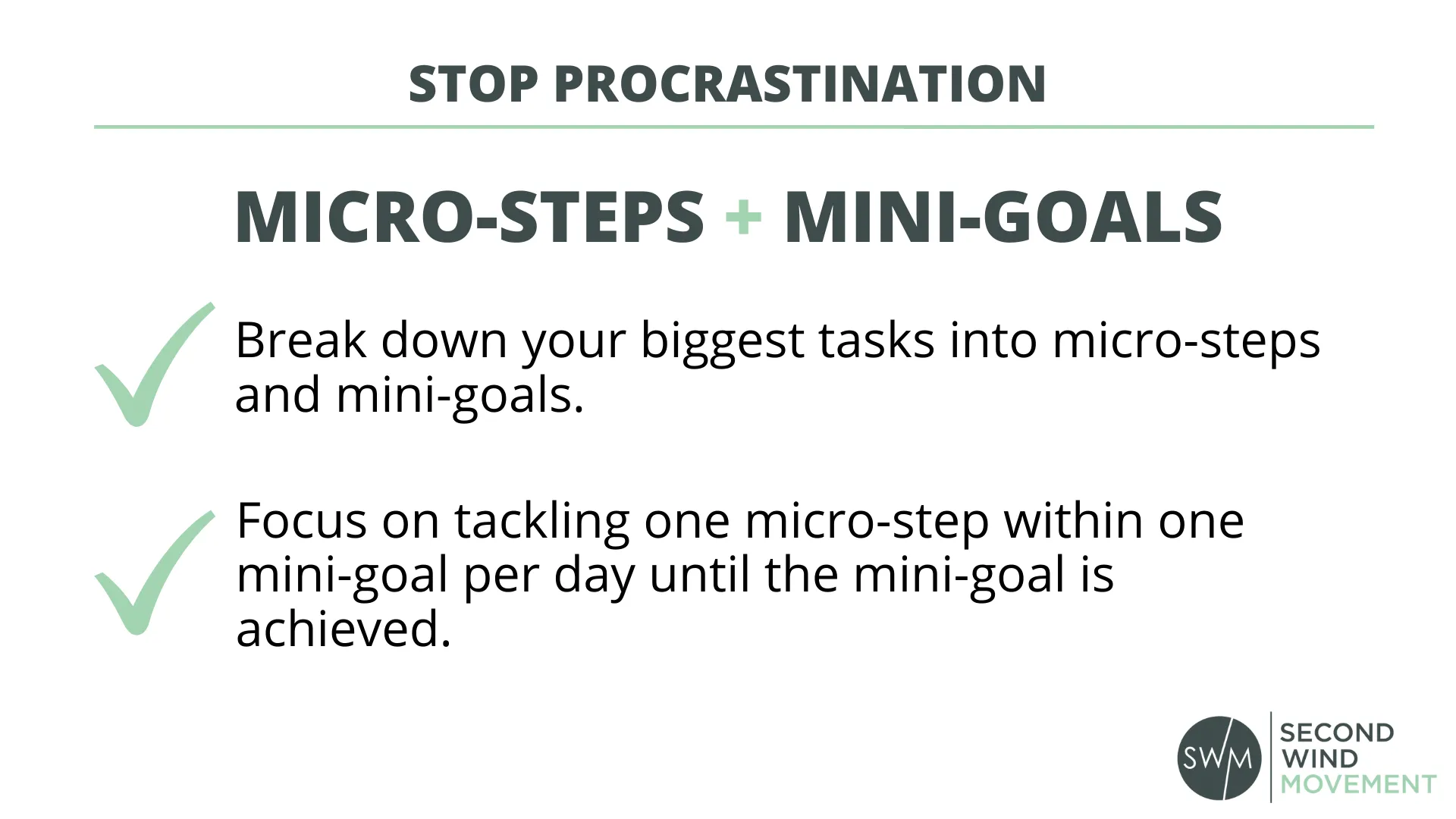
So don’t let the idea of setting goals intimidate you — embrace it as a way to make the most out of your retirement.
The Best is Yet to Come
Change can be scary, but finding clarity and creating a plan for intentional growth is the best way to move past retirement syndrome.
Here’s a reminder how to overcome the dreaded retirement syndrome:
- #1 The art of letting go — embrace the freedom that retirement brings by letting go of pre-retirement worries and embracing your new identity and growth journey
- #2 Reach out & connect — expand your social network through shared experiences and activities with people who energize you
- #3 Stay healthy — focus on being the healthiest version of you, both physically and mentally
- #4 Discover your passions — rekindle old hobbies and explore new ones to fill your days with joy
- #5 Set new goals — break down your big goals into manageable tasks using the powerful method of micro-stepping
Everybody deserves a chance to make their later years truly rewarding.
And we want to help you achieve the purposeful retirement lifestyle that you have always wanted — so join us for our free masterclass on The Rewire Method: How to turn your successful career into a successful retirement.
Retirement Syndrome FAQ
How to deal with retired husband or wife syndrome?
As retirement approaches, many couples look forward to the prospect of spending more time with each other. But sometimes an unforeseen challenge arises — the retired husband or wife syndrome.
Suddenly, being together 24/7 can lead to marriage problems, feelings of frustration, boredom, or even resentment. Or alternatively, only one spouse retires.
The dynamic of the relationship changes, and it can be difficult to navigate. But this can be an important time of growth and a chance to explore new interests together.
Communication is key during this time, and both spouses should make an effort to listen and understand each other’s needs. It’s also vital to maintain individual hobbies and friends to avoid becoming overly reliant on one another.
Above all, stay positive and embrace this new chapter in your lives together.
What is pre-retirement syndrome?
Pre-retirement syndrome is the anxiety and stress that people experience in the years leading up to retirement.
It’s normal to feel a sense of uncertainty when it comes to such a major life change, and for many, they fear the idea of retirement. But it’s never too late (or early) to take control of your retirement plans and you can overcome the challenging retirement transition.
What is sudden retirement syndrome?
Sudden retirement syndrome is a term that describes the phenomenon of people retiring unexpectedly. It can bedue to circ*mstances like unplanned health issues or sudden changes in the workplace.
While traditional retirement can be a time of excitement and anticipation for many individuals who plan their date, experiencing sudden retirement can feel like being thrown into the deep end without a life raft.
But just because your retirement date wasn’t planned or chosen by you, it doesn’t mean it can’t be fulfilling.
